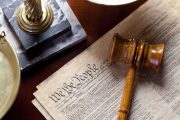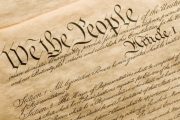On June 18, Governor John Lynch of New Hampshire signed into law HB 146, a bill granting to juries in that state the right “to judge the application of the law in relationship to the facts in controversy.”
Representatives Lars Christiansen, Dan Itse, and the Speaker of the House sponsored HB 146 in the New Hampshire House of Representatives. Senators Jim Forsythe and Fenton Groen pushed for the bill on the senate side of the state legislature.
Juries in New Hampshire may now override the rulings of judges if they believe the judges are misinterpreting or misapplying the relevant law. Furthermore, defense attorneys may now, over a judge’s objection, inform a jury that it has a right to judge the application of the law in relationship to the facts in controversy. This is known as jury nullification and it has a rich history in American jurisprudence.
Before one is able to understand why jury nullification is a good idea, one must understand the importance of a trial by jury. Our Founding Fathers universally considered them to be a powerful weapon in the war against tyranny.
Thomas Jefferson wrote, “I consider trial by jury as the only anchor yet imagined by man, by which a government can be held to the principles of its constitution.”
In the Federalist Papers, Alexander Hamilton wrote that trial by jury was the “very palladium of free government” and a “valuable check upon corruption.”
Hamilton’s fellow Federalist author and Supreme Court Chief Justice John Jay informed a jury in a 1794 case that:
It may not be amiss, here, Gentlemen, to remind you of the good old rule, that on questions of fact, it is the province of the jury, on questions of law, it is the province of the court to decide. But it must be observed that by the same law, which recognizes this reasonable distribution of jurisdiction, you have nevertheless a right to take upon yourselves to judge of both, and to determine the law as well as the fact in controversy.
Given the strength of these opinions, then, it is no surprise that the denial of trials by jury was one of the foremost acts of despotism listed by Thomas Jefferson in the Declaration of Independence.
As for the concept that juries have not only the power but the obligation to nullify unjust rulings of a judge, John Adams wrote, “It is not only [the juror’s] right, but his duty … to find the verdict according to his own best understanding, judgment, and conscience, though in direct opposition to the direction of the court.”
And Hamilton, again from the Federalist Papers, described the jury’s check on the judge as a “double security” that “tends to preserve the purity” of both judge and jury.
So, we can see that the idea that juries may act contrary to the will of a judge is nothing new in American law and in fact it is an act of resistance to government oppression that our Founders believed to be fundamental in a Republic that was to remain free under the rule of law, rather than enslaved according to the rule of men.
New Hampshire is faithfully following our Founders’ philosophy. The New Hampshire law reads:
In all criminal proceedings the court shall permit the defense to inform the jury of its right to judge the facts and the application of the law in relation to the facts in controversy.
Permitting defense attorneys to directly address the jury regarding its right to be judges of the facts and the law is something unheard of in nearly every courtroom in the United States.
Of course, as one writer has observed, this law may not go far enough in restraining the power of corrupt judges.
We don’t know how much pressure trial judges will exert on defense counsel. As noted above, if the attorney’s argument is “too strenuous,” the judge may reprimand the attorney in some way or deliver his own strenuous instruction about how the jurors must ultimately accept the law as described by the court, not the defense. I’m also afraid what the jurors hear will too often depend on the particular judge and, then, what that judge wants to do in a particular case.
For now, constitutionalists will be pleased by the following explanation of the purpose of the bill as put forth in Section 243:1:
The jury system functions at its best when it is fully informed of the jury’s prerogatives. The general court wishes to perpetuate and reiterate the rights of the jury, as ordained under common law and recognized in the American jurisprudence, while preserving the rights of a criminal defendant….
As indicated by the statements provided above, our Founding Fathers zealously defended this right and recognized that only an informed and empowered jury could effectively protect a defendant from the potentially harmful effects of autocratic judges.
On its website, the Fully Informed Jury Association ably sums up the reason jury nullification is a good idea and one supported by Constitutional principles of freedom from tyranny.
The primary function of the independent juror is not, as many think, to dispense punishment to fellow citizens accused of breaking various laws, but rather to protect fellow citizens from tyrannical abuses of power by the government.
The Constitution guarantees you the right to trial by jury. This means that the government must bring its case before a jury of the people if government wants to deprive any person of life, liberty, or property. Jurors can say no to government tyranny by refusing to convict.
HB 146 goes into effect on January 1, 2013.




